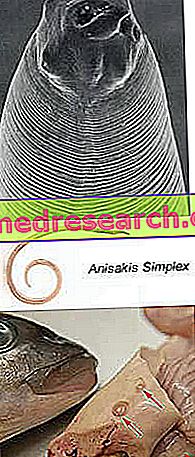Definition
Endometriotic disease, better known as endometriosis, is a morbid condition typical of the fertile age, which is characterized by the growth of an ectopic endometrial tissue.
Causes
Despite the clinical interest in the disease, endometriosis still remains an unknown factor for many scholars: in fact, the triggering causes are not yet clear. Currently, we only have theories that are not fully proven on the etiology of endometriosis.
Symptoms
The symptoms related to endometriosis are painful and annoying: changes in the menstrual cycle (dysmenorrhea, menometrorrhagia, menorrhagia), abdominal cramps, diarrhea, dyspareunia, severe lower abdominal pain, constipation and subfertility.
Complications: transudation of blood during menstruation → local irritation, scarring, adhesions between various organs
Information on Endometriosis - Drugs for the Treatment of Endometriosis is not intended to replace the direct relationship between health professional and patient. Always consult your doctor and / or specialist before taking Endometriosis - Drugs for Endometriosis Care.
drugs
Before starting a pharmacological treatment, it is recommended to wait 6-12 months, since spontaneous healing is possible. However, for women with endometriosis who do not witness a spontaneous regression, medical pharmacological or surgical therapy is recommended (in the most serious cases).
The treatment of endometriosis is essentially based on the use of drugs with anti-estrogenic activity, useful for atrophying the ectopic endometrium.
The following are the classes of drugs most used in therapy against endometriosis, and some examples of pharmacological specialties; it is up to the doctor to choose the most suitable active ingredient and posology for the patient, based on the severity of the disease, the health of the patient and his response to treatment:
SYNTHESIS SUMMARY OF LH-RH:
It is the therapy of first choice for the treatment of endometriosis. These drugs work by blocking the secretion of some pituitary hormones, thus inhibiting estrogen synthesis by the ovary.
- Leuprorelin (ex. Enantone, Eligard): indicated in case of genital and extra-genital endometriosis. It is recommended that 11.25 mg of drug be administered intravenously once every three months; alternatively, it is possible to administer the substance subcutaneously, at a dose of 3.75 mg in a single dose in the first 5 days of menstruation, and then take the drug every month for a maximum of 6 months. Furthermore, it is possible to administer the drug by intramuscular injection at a dose of 11.25 mg in a single dose in the first 5 days of the menstrual cycle, then every 12 weeks (maximum duration: 6 months).
- Goserelin (eg. Zoladex): indicated to lighten the symptoms of endometriosis (reduction of pain and lesions affecting the endometrium) to the posology of 3.6 mg of drug by subcutaneous route (application at the level of the abdominal wall). The 3.6 mg dose can be repeated every 28 days, as directed by your doctor. Generally, the application should be repeated 6 times (ideal overall duration of therapy: 6 months).
- Triptorelin (eg Gonapeptyl-Depot, Fertipeptil, Decapeptyl) administered by intramuscular injection 11.25 mg of drug every three months. Alternatively, administer 3 mg of the drug every 4 weeks.
- Leuprolide (eg Lupron): in case of endometriosis, it is recommended to take 3.75 mg of drug intramuscularly once a month for six months; alternatively, take 11.25 mg of leuprolide every 3 months.
PROGESTERONE DERIVATIVES
PROGESTINICS → are widely used in therapy in order to induce a progressive, albeit slow, reduction of ectopic endometriotic tissues, up to obtaining their complete atrophy.
- Norethindrone (Ex. Activelle): the recommended dose for treating endometriosis is one tablet of 5 mg per day for 2 weeks. The dosage can be increased by 2.5 mg per day for two weeks, up to a max. of 15 mg a day. The therapy can be continued for 6-9 months, according to the doctor's indications.
- MEDROXYPROGESTERONE (eg. DEPO PROVERA, FARLUTAL, PROVERA G): the drug is available in the form of film-coated tablets of 5 - 10 mg of medroxyprogesterone. It is recommended to take one tablet once a day, as an addition to an estrogen replacement therapy (which must be started from the 1st or 16th day of each cycle, and continued for 12-14 consecutive days per month. Alternatively, take 2.5 mg per day orally during estrogen replacement therapy). The posology just described is useful, in particular, for the prophylaxis of atrophic endometriosis. For the treatment of the disease, it is recommended instead to administer 104 mg of drug by subcutaneous way, once every three months, respecting the indications dictated by the doctor.
DERIVATIVES OF ANDROGENIC HORMONES (gonadotropin antagonists)
They carry out their therapeutic activity by reducing the blood levels of estrogen and progesterone (inhibition of ovulation), thus inducing the ectopic endometrium to atrophy.
- Danazol (eg Danatrol): it is recommended to take the drug at a dose of 100-200 mg per day orally. In case of severe endometriosis, the dose can be increased up to 400 mg, taken twice a day. For most patients, drug therapy is effective when it lasts for 3-6 months, or even 9 when it is a particularly severe endometriotic form. Danazol is currently registered in Italy for the treatment of endometriosis.
- Gestrinone (eg Dimetrose): in the case of endometriosis, the gestrinone should be taken at a dose of 2.5 mg twice a week (beginning of therapy: first day of the cycle). Take the second dose three days after the first administration of the drug, repeating the same dosage on the same days of preference (it is recommended to take the gestrinone at about the same time and on the same days every week). In general, the therapy should be continued for 6 months.
COMBINED ESTROGENES: by blocking ovulation, the risk of endometriosis is considerably reduced, ensuring a certain "protection on the endometrium" up to 12 months after drug withdrawal.
- Ethinyl estradiol / Levonorgestrel (eg Loette, Microgynon, Miranova, Egogyn): these are contraceptive pills useful for inhibiting the overproduction of gonadotropins, therefore also indicated in the treatment of endometriosis. These drugs are available in packs of 21-28 tablets: each tablet consists of 0.02 mg of ethinyl estradiol and 0.1 mg of levonorgestrel. The pharmacological treatment involves taking one tablet a day, for 21 days, possibly at about the same time each day, followed by a free one-week interval.
- Desogestrel / Ethinyl estradiol (eg Gracial, Novynette, Lucille, Dueva, Securgin): these are tablets coated with 20 mcg of ethnyl estradiol and 150 mcg of desogestrel. The dosage of these drugs reflects the one described above: the correct modality of taking these active ingredients guarantees a significant reduction of the symptoms linked to endometriosis, as well as a clear improvement in the patient's clinical profile.



